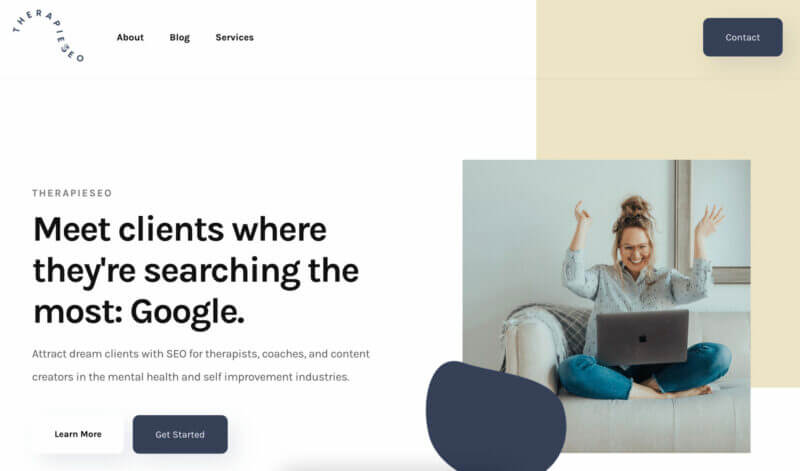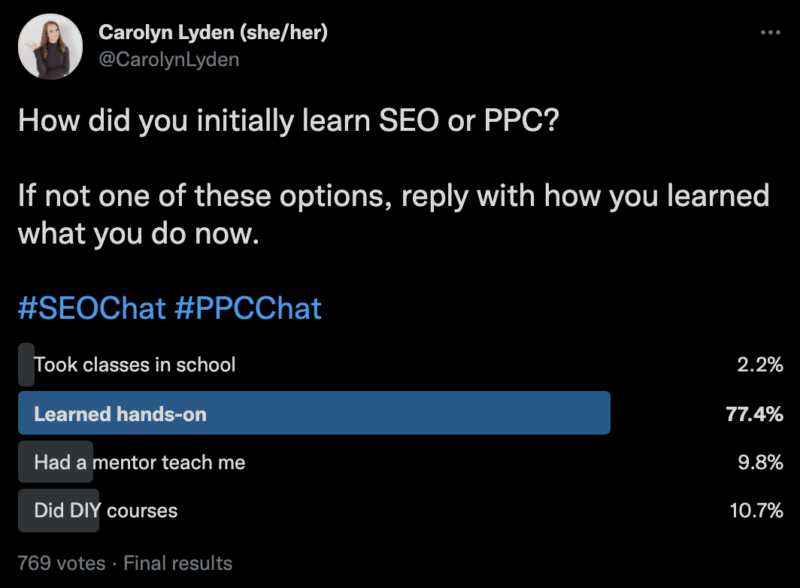It’s no secret that it’s a job seeker’s market right now. While the pandemic may have initially hampered companies’ investment in SEO and PPC, as the lockdowns continued and more people took their lives online search marketing became paramount. Even anecdotally, I noticed an uptick in businesses interested in SEO services as they realized that they needed to be found online now more than ever.
Employees are getting antsy for career development and advancement. This shift means that search marketers have the power to set the tone for what’s next in their careers, but we’re not the only ones. According to Prudential Financial’s Pulse of the American Worker survey, 26% of workers planning to switch jobs post-COVID, 80% are doing so because they’re concerned about career advancement. The pandemic has led to a “very real experience that employees have had around a lack of career progression and a concern around skills development,” says Rob Falzon, vice chair at Prudential. People feel that they have been working hard but have not been given opportunities to advance professionally in their current company, wrote Caroline Castrillon for Forbes.
Shifting search landscapes mean shifting career skills. In search marketing, we’re seeing a move toward the larger players taking away our individual controls and levers. To advance we have to rewrite the old search marketing playbook. Problem-solving has always been our forte, but we have to be even more creative now as data is taken away, more of our processes are being automated, and we have to expand beyond our own siloes to get things done. Leveling up your career — regardless of how you decide to advance it, is all about becoming a strategic leader.
In my opening keynote at SMX Next today, I’m going to go through these nine key tips for becoming a search marketing leader in your area. It’s about more than just your spreadsheet skills (though that’s important too).
A caveat. Before we dive in it’s important to remember that career progression is not always linear. Especially with the fluctuating nature of work over the past two years, you may have found yourself having to take a break to help with homeschooling or taking care of a sick family member. Or perhaps your work increased dramatically faster than you anticipated and you’re still reeling. Whenever you are right now, just remember: You’re exactly where you need to be. And these are the steps to take to get to where you want to go.
1. Tech skill are important.
The foundation of SEO and PPC are technical skills. Search engines are giving us the numbers behind user experience, and we need the quantitative and specialized skills to be able to make those changes a reality. A while ago, someone asked Barry Schwartz what he thought would be a differentiator in SERPs in the coming years, and he replied, “Content.” His reasoning was that technical SEO and PPC skills will become table stakes. We will all need to have them just to get by.
We’re seeing a huge wave of more technical skills in both emerging as practitioners are finding new ways to automate their own processes, pull and analyze data to create reports that matter for each target audience, and manage the more specific back-end details of website accessibility. We’ve always been a technical field, and those skills aren’t going anywhere.
2. People skills are important-er.
While tech skills are table stakes in search marketing, the “softer” skills are often more varied and sometimes harder to come by. There’s, of course, an element of search marketing that’s just, sort of, intuition. Once you’ve been working in the field for a while, you can just tell what searcher intent is with specific queries. You learn your target marketing and your industry so well that you truly understand the people you’re serving.
The other key people skill in SEO and PPC is empathy. Microsoft regularly promotes their Marketing with Purpose Playbook which talks about expressing to your customers that your products and services are for them: “85% of consumers say they’ll only consider a brand if they trust the brand,” said MJ DePalma at Microsoft Advertising. “Authenticity is the most important attribute to brand performance.” Being able to convey authenticity in your search marketing isn’t easy! It’s a skill we have to work to build and hone, but it’s one worth investing in.
3. Not everyone wants to be a manager.
Many times when people move to the next level of their careers, they think it means they have to become a manager. The fact is not everyone wants to manage people. Some people really love the individual contributor work that they do and don’t want to give that up! In her book Radical Candor, Kim Scott talks about two types of employees: rock stars and superstars.

Rock stars are the steady rock of a department. They know how to do what they do really well, and they get exceptional results. Their growth trajectory may be more steady, but they love their jobs and don’t really want their boss’s job.
Superstars, on the other hand, are the type of people who absolutely cannot stand the thought of doing the same job two years from now. They have a much steeper growth trajectory and are excited at the thought of taking their boss’s job someday (someday soon, preferably).
The path that I think Radical Candor leaves out is for people who want to go out on their own. They don’t want their boss’s job because they don’t want a boss at all! Any of these career paths are great. And, honestly, you may want to partake in any of them at any time given what’s going on in your life.
4. It’s ok if you don’t have a 5-year plan.
Someone told me once that when she asked for a raise at her job her boss countered by asking for her five-year career plan with the company. She asked my advice, and I honestly didn’t have anything good because 5 years is a long time! Sure, having an idea of where you want to go is great! But no one needs a detailed career map with an accompanying timeline.
So much can happen in 5 years. I bet 5 years ago no one could have predicted COVID-19 and how it would affect the workforce. If a career map makes you feel better, then don’t let me sway you from achieving your goals, but also remember to be flexible in your timelines and trajectories. You may get there a little slower or a lot faster than you anticipated.
5. Work on negotiation.
Regardless of whether you want to be a manager, an individual contributor, or an entrepreneur, almost everyone can benefit from leveling up their negotiation skills. While it can help you increase your salary and get better benefits at work, it’s also a beneficial skill in general. Negotiations are truly just conversations where two sides are coming together to discuss their interests and come to an agreement.
Negotiation skills can benefit you when you’re working with vendors, problem-solving with colleagues, determining scope of work with clients, or even determining whose turn it is to empty the dishwasher at home. Many people are nervous about negotiating, but the most you practice it in everyday life, the easier it gets. If you can work on negotiating in these smaller conversations, the bigger negotiations (like salary!) will come a lot easier.
6. Pursue your strengths.
In his book The 4-Hour Workweek, Tim Ferris talks about relentlessly pursuing your strengths and not worrying too much about your weaknesses. “By improving your strengths over your weaknesses, you focus on multiplying the results as opposed to incrementally fixing your flaws,” summarized Elle McFarlane for Oberlo. In business, this is called, “niching down.” The idea is that YOU know where you are the absolute expert and pursuing that arena would benefit you more than trying to learn everything about search marketing.
For example, I found out about Kristie Plantinga from iPullRank’s People Supporting SEOs list. I found her site really beautiful and asked her how she decided to niche down into SEO specifically for therapists: “I work with therapists because I was going to become a therapist [but] pursued my love of writing instead. Before working with therapists, I worked with lawyers. [I found out that some] lawyers are really aggressive, so I decided to niche with professionals I knew would be kinder and more patient. I didn’t end up working directly in mental health, but now I can support people who do,” she told me on Twitter. She pursued her strengths and area of expertise and serves the therapy community.

Instead of trying to fix all your areas of weakness, find ways to amplify your strengths like Plantinga!
7. Start a win list.
Along with helping in potential job negotiations, starting a win list gives you a tool to help kick imposter syndrome when you’re feeling it sneak up on you. Start by creating a folder on your desktop or Google drive and any time someone says anything remotely nice about you, your work, or working with you, take a screenshot. Put the screenshot in the folder for when you need it later.

This is also a great place to keep a running document of your achievements and projects. Keep track of the quantitative and qualitative wins you achieved (and things you said yes to outside your scope of work). That way, when it does come time to ask for a salary bump, you have the metrics and testimonials to prove you earned it. Plus, you can look at all your win list screenshots and organize them by themes. This will tell you what your superpowers are so you can continue to pursue them (see tip 6 above!).
8. Ask for what you need at work.
As I mentioned in the intro, it’s a search marketer’s job market right now. Not only has the pandemic accelerated the need for SEO and PPC, but it’s also dramatically changed the way we work. We’re working from home more, and it’s been nice to give up commuting and save money on lunches out. But it also means we are balancing more than ever, and there’s often no real differentiator between work time and home time since they all occur at the same place now.
There is a viral TikTok video going around now talking about the 8-hour workday. The premise is that the way our workweeks were originally built catered to those doing assembly-line-type jobs. Nowadays we can work from anywhere and get our work done at any time, so the way companies think about a workday should shift to accommodate that.
All this is to say that you have the power as the employee to advocate for what you need to make yourself a successful search marketer. Ask for what you need and don’t be afraid to ask your coworkers if they’d like to join in the negotiations with you. Now is a great time to consider what you need to do your best work and to talk with your leadership about making it happen.
9. Give back to the search community.
Finally, once you’ve worked relentlessly to become the best, next-level search marketer in your industry, make sure you consider giving back to the SEO and PPC communities. Even if you don’t want to become a manager, you could always give back by becoming a mentor.
I did an informal Twitter poll a while back asking how people learned search marketing. Only 10% of search marketers had a mentor guide them along the way:

Mentorship is one way to help accelerate the careers of others in SEO and PPC. Plus, there are some benefits to you as a mentor:
- Improve your communication and personal skills.
- Develop leadership and management qualities.
- Reinforce your own study skills and knowledge of your subject.
- Increase your confidence and motivation.
- Increase your network.
The Search Engine Land mentorship program, for example, hosted three mentorship matches each in both SEO and PPC. These mentorships varied in topics from technical SEO skills to how to manage a team all the way to getting your dream job in search. It doesn’t have to be a formal commitment like our program, but any way you can take your career advancements and offer a hand in search will grow the community as a whole.
Career progression isn’t always linear. Whether you’re entry-level or the CEO of a thousand-person organization, there are always areas to continue to develop to improve your career and its effect on those around you. These nine tips are a good starting point to continue to cultivate your career path and keep growing as a human and a search marketer.
http://feeds.searchengineland.com/~r/searchengineland/~3/RQif6TCV9gk/9-ways-to-level-up-your-search-marketing-career-375846


